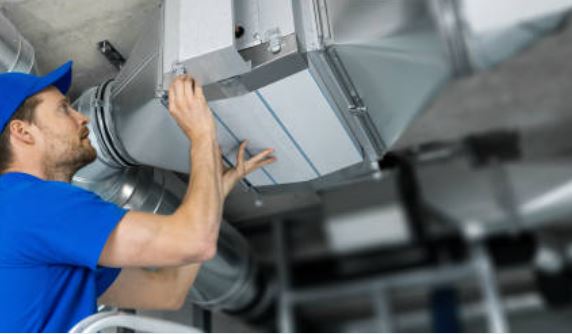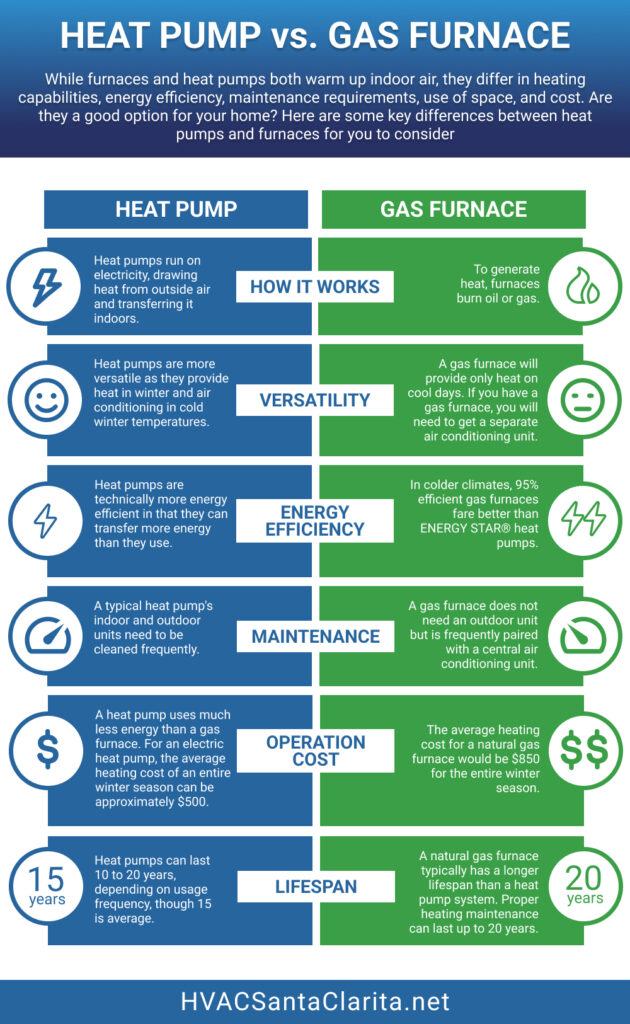The heat pump vs. gas furnace debate has been engaging for a long time. And, here at HVAC Santa Clarita we have decided to give our word.

call 661-888-0248
Contact us 24/7 today to make an appointment.
Everyone wants to know which is the best for them as a part of new HVAC system research. The same as homeowners constantly wonder gas furnace or electric furnace? It takes time to do research and get the knowledge. Well, they all generate heat for your home and will keep you warm on those cold days. However, they do this differently.
Their mechanisms, costs, functionality, and efficiency are different. And with this, what works well for your neighbor may or may not work well for you.

You, therefore, want to choose a heating system that will suit you in as many aspects as possible.
And, that is what we wrote this article for, comparing and contrasting heat pumps to gas furnaces. And most importantly, to give you all the necessary information you need in choosing a heating system.
Let’s get down to business.
Heat Pumps Overview
A heat pump is part of a cooling and central heating system. A heat pump will heat your home in winter and cool it during summers. It is, therefore, a versatile product.
They do the heating and warming by moving air. Think of it as a heat transporter. It does this by moving warm air to where it is needed, depending on the season. If it is cold, it moves warm air from outdoors to indoors. And if it is warm, it moves the hot air from indoors to outdoors.
What is a Gas Furnace?
A gas furnace is also a part of a central heating and cooling system. It converts natural gas(1) into heat which is then transferred through your house.
The gas furnaces have several main components:
- burners that burn and deliver fuel,
- inducer motor
- a flue that serves as an exit for gaseous byproducts,
- heat exchangers
- gas valve
- blower motor
- thermostat
- control board
- limit switch
- transformer
- fuse
- other minor parts
Heat pump vs. gas furnace Comparison: Which is the best for you?

In this segment, we dig deeper into the details of heat pumps and gas furnaces. We look at all the physical and operational aspects of the two.
With this, we hope you acquire valuable knowledge that will help you make your best choice. Let us dive right into the details.
Heat pump vs. gas furnace: How they work
A gas furnace burns natural gas to generate heat used to warm your house. However, heat pumps run on electricity; they draw heat from the outdoors and transfer it indoors.
And, for this, then it is clear that heat pumps produce less heat than a gas furnace. That, therefore, makes heat pumps an ideal choice for warmer climates and gas furnaces an ideal choice for cold climates.
Heat pump vs. gas furnace: Versatility
Heat pumps are more versatile as they provide heat in winter and air conditioning in cold winter temperatures.
On the flip side, a gas furnace will provide only heat on cool days. If you have a gas furnace, you will need to get a separate air conditioning unit.
However, you can have what is called a dual heating system(2) installed for you to avoid installing a separate cooling system. A dual fuel heating system offers greater saving possibilities. One perfect way to do this would be to pair an air source heat pump with a gas pump. The system will determine the outdoor temperature to gauge the most efficient option to warm your home with the two heat sources.
Heat pump vs. gas furnace: Energy Efficiency
Scientifically, heat pumps are more energy-efficient than gas furnaces. This is because they transfer more energy than they use. And, a gas furnace has to burn gas to produce heat.
However, the comparison of the energy efficiency of these two may get complicated. For instance, high efficient heat pumps in warmer climates will typically use less energy compared to gas furnaces in the same climate. In colder climates, 95% of efficient gas furnaces are more energy-efficient than an electric furnaces.
You should, however, also consider the long-run costs. Put in mind that natural gas is cheaper than electricity.
Heat Pump vs. Gas Furnace: Maintenance
Both heat pumps and gas furnaces will last longer with proper heating maintenance.
First, both heat pumps and gas furnaces have air filters. With this, you need to frequently replace them.
A typical heat pump’s indoor and outdoor units need to be cleaned frequently. A gas furnace does not need an outdoor unit but is frequently paired with a central air conditioning unit. For this, too, you will need frequent HVAC maintenance practices.
Heat Pump vs. Gas Furnace: Operation Cost
What are the monthly utility bills of running heat pumps and gas furnaces?
Heat pumps do not use fuel to heat a space. They only need enough electricity to circulate refrigerant through the pressurized lines. Therefore, a heat pump uses much less energy than a gas furnace.
We, however, want you to know that the operating costs and your monthly bills will depend on your usage and where you live. The average heating cost for a natural gas furnace would be $850 for the entire winter season. For an electric heat pump, the average heating cost of an entire winter season can be approximately $500.
Heat pump vs. gas furnace: Installation costs
Another important factor to consider is heater installation costs.
The average cost of installing a gas furnace is around $4500, while a heat pump costs around $4000.
However, if you would like to go for the most efficient gas furnace that will save you energy in the long run, it can cost you up to $10,000.
That is it about the buying of the equipment price. You can pay anything from $3,500 to $4500 for electric furnaces for the installation costs. This excludes geothermal heat pumps whose installation costs may go up to $25,000.
However, to simply put it, the upfront costs of gas furnaces are higher than that of a heat pump. You may save even much more with a heat pump, considering that you do not need an air conditioner.
Heat pump vs. gas furnace: Space
Space is another critical factor to consider in your selection.
Typically, furnace installation is done indoors. And to install a furnace, you need clearance from manufacturers and local building codes. You need a 30-inch clearance on all sides for fire safety reasons.
The heat pump’s compressor needs a minimum of 24 inches of clearance around the outdoor unit. However, no space clearance is needed for an indoor heat pump. This is because an indoor heat pump does not use combustible fuel or generate heat. It, therefore, does not need additional safety clearance.
Depending on the type of air handler for a heat pump, you might mount it high on the wall to save on the floor space.
Therefore, if you do not have a lot of space, you might highly consider going for heat pumps.
Heat Pump vs. Furnace: Climates
Another factor to consider when choosing between heat pump systems and gas furnaces is your climate.
To get straight into it, gas furnaces work perfectly in cold climates. This is because they generate heat and quickly warm air. However, a heat pump system transfers warm air outdoors when the outdoor temperature is higher. From this, it is clear that heat pump systems may not warm your house enough in frigid temperatures.
However, remember that a heat pump system can draw heat from a freezing environment.
Because of how they work, heat pumps produce less heat than furnaces and work best in warmer climates (zones 1-3 on the U.S. Department of Energy climate zone map).

MAP SOURCE: HTTPS://BASC.PNNL.GOV/IMAGES/IECC-CLIMATE-ZONE-MAP
However, the more the outdoor temperature drops, the less efficient the heat pumps become.
However, geothermal heat pumps are efficient in colder climates. If you live in a cold climate and would like a heat pump, we recommend considering a geothermal heat pump.
Heat pump vs. Furnace: Noise
Both heats pump and a gas furnace make grinding, screeching and rattling noises when they have mechanical problems. And if you notice any of this, it is time to call for heating repair.
However, when the two function normally, a heat pump is noisier than a gas furnace. With a heat pump, you will frequently hear clicking and knocking sounds. These come from the compressor circulating the refrigerant through the line powers. This is normal with a heat pump and is not a sign of a problem.
Many times, a furnace is often located away from the living room. And even so, the sound they make is a soft whoosh of air.
Heat Pump vs. Furnace: Comfort
Air source heat pumps do not produce hot air as gas furnaces. Yes, heat pumps warm your house, but they blow more relaxed air. Some people won’t like that, especially when it gets cold.
Besides, the heat pump system blows naturally humid air. This comes with some side effects and also discomfort. If you want more hot and dry air, you may need to use a natural gas furnace.
Heat Pump vs. Furnace: Lifespan
A natural gas furnace typically has a longer lifespan than a heat pump system. Proper heating maintenance with necessary gas furnace repairs can last up to 20 years. On the other hand, a heat pump is 15 years.
The heating element of gas furnaces is used only a few months a year. You will not be heating your house with a gas furnace on the hottest days of summer.
However, you will most likely use your heat pump system all year round. Therefore, it is normal for you to need regular heating maintenance. And, it is expected that it will have a short lifespan.
Also, a natural gas furnace has fewer mechanical and moving parts than heat pumps. Heat pumps have many moving parts, and it is normal for them to have breakdowns or malfunctions.
Both should be professionally sized and installed

When it comes to sizing and installing heat pumps and gas furnaces, you need professionals. For both of them, have a professional HVAC contractor come and measure:
- the volume of air in your living area,
- the climate of your region,
- your installation budgets.
We will help you choose the correct size heat pump or gas furnace with these factors in mind.
Remember that when you choose something more undersized than usual, you will overwork your system. And, with this, you will need frequent heating repairs. Also, a small heat pump or gas furnace will not heat you enough on those cold days.
On the other hand, if you purchase an oversized gas furnace, it will cycle on and off frequently. This leads to frequent indoor temperature variations.
What is a Dual Fuel System?

A dual fuel system is a blend of the desirable features of a gas furnace and those of a heat pump to come up with a more efficient heating system.
In this case, the heat pump part of the system operates when it is hot or not so cold. However, when the temperatures drop, the gas furnace takes over automatically and heats your house.
That there improves your comfort in the house. You have just enough warmth when you need it and enough cool air when you need it.
And even more notably, the dual-fuel system is highly efficient and saves you much more money.
Frequently Asked Questions

We answer some frequently asked questions on gas and heat pumps. With these, we hope you get all the information you need to choose between a heat pump or a furnace.
Is it cheaper to heat with gas or heat pump?
Generally, heat pump installation cost is lower than gas furnace installation. Also, the monthly utility bills of a gas pump will be higher in the winter months.
However, a heat pump needs frequent heating services due to its many moving parts.
Which is better, a heat pump or a gas furnace?
We hate to tell you it depends, but it does. How warm do you want your house to be? If you are looking for lots of hot air, you should get a gas furnace. When you are just looking for mild warm air, probably because you already live in a warm climate, a heat pump will serve you well.
What are the disadvantages of a heat pump?
First, they blow humid air. And secondly, they are less efficient when it is cold. Thirdly, it may take some time to heat your home when you switch it on.
Final Thoughts

We mark the end of our heat pump vs. gas furnace comparison. At this point, we trust that you are aware of their features and can choose what suits you best.
All in all, for both of them, you need to ensure your house is well-insulated to minimize heat loss and increase energy efficiency.
To wrap it up, if you would like help in selecting the two, feel free to reach out to us at HVAC Santa Clarita. We will gladly help you.

call 661-888-0248
Contact us 24/7 today to make an appointment.
Our Address is
HVAC Santa Clarita
26893 Bouquet Canyon Rd
Santa Clarita CA 91350
Opening hours
Monday 8 am – 8 pm
Tuesday 8 am – 8 pm
Wednesday 8 am – 8 pm
Thursday 8 am – 8 pm
Friday 8 am – 8 pm
Saturday 8 am – 8 pm
Sunday 9 am – 5 pm
Also, read
